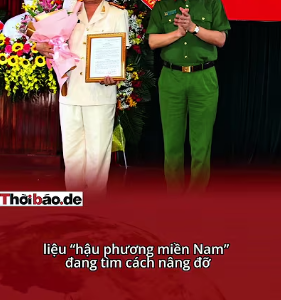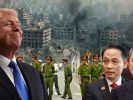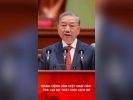The assertive policy of asserting Chinese power and sovereignty in recent days seems to be creating more rivals for Beijing, but with its sovereign neighbor state disputing with China in the South China Sea is Vietnam. Nam, some experts have told VOA that Hanoi is unlikely to be in a position to confront Beijing, though it seems to be leaning toward the US with a stronger voice supporting the US position.
As chair of ASEAN this year, Vietnam has said that it has led ASEAN countries to „thank and appreciate“ US support after the US Congressional Committee rejected China’s sovereignty claim in the South China Sea, a move that according to TS. Ta Van Tai, a law professor at Harvard University, is pushing to further express the views of Southeast Asian nations after a series of official US statements.
„Vietnam, as chair of ASEAN this year, also follows the voice of ASEAN in general and elevates ASEAN’s perspective, which means that for the first time Vietnam dares to speak more strongly with China,“ Prof. Ta Van Tai commented with VOA.

According to Prof. Tai, this is the only strong point that Vietnam has shown so far to China, but has not yet come to a more decisive action to sue Beijing about its claim to sovereignty over the Hoang Sa (Paracels).
Meanwhile, China, through the Global Times newspaper, continues to warn Hanoi about „choosing sides“ against Beijing.
“If US involvement in the South China Sea raises regional tensions or disrupts the balance in relations between China, Vietnam, and the US, then Vietnam’s development will be interrupted. Vietnam’s losses will be far greater than the benefits received,“ the Communist Party newspaper said in an analysis of US-China relations after the US issued a statement calling Beijing’s claims in the South China Sea is „illegal.“
Comment on this issue, Ph.D. Ha Hoang Hop, a senior researcher at the Institute of Southeast Asian Studies (ISEAS) in Singapore, told VOA: „China has raised the issue when it warns small countries around it not to follow a country to work against China.“
However, according to him, “Once national interests are violated while it is too small, there is no way to resist it unless the smaller country is asking support from others, especially from giant countries.”
So Dr. Hop said that even if Vietnam now has a „four no“ defense policy, which has the principle of „not joining the military alliance, not associating with one country to oppose the other,“ in the situation the national interests are threatened, Vietnam will surely abandon the above policies to seek assistance or „allies“ to fight back.
“So, if China says that Vietnam is leaning towards the US or the US is not an intermediary, America still stands in the middle. Therefore, the US did not mention anything else, not to mention Hoang Sa, but the US relied on the same thing as the UN Convention on the Law of the Sea and the issue of the continental shelf.” Hop said that this is the common point that Vietnam and the US at first glance seem to be „side“ with each other.
And Prof. Tai stated that the US position has not changed so far. The US still has not interfered with the issue of which sovereignty islands on the islands and which rocks in the disputed areas. However, this „more specific“ statement by the State Department, Congress, and US officials has benefited Vietnam in many ways, according to both researchers.
„The US has voiced support in a specific way, which is political interest,“ Dr. Hop said. “And the strategic benefit of having a commitment in the American statement is that they ensure that there is no predatory policy in this 21st century. Americans will not let the Chinese continue to follow this path. „

Diplomatically, Dr. Hop said that the US statement represents a „major step“ of the US in taking concrete action in support of the dispute settlement process to maintain peace and freedom of navigation in the South China Sea.
Meanwhile, Prof. Tai said that Vietnam can never become a rival to China militarily, but that does not mean it can not „fight“ with China in the issue of sovereignty in the South China Sea.
“Although Vietnam has the third strongest navy, after the US and China, in the South China Sea, it can never be China’s opponent when standing alone, it can only be more courageous because the US has established itself. In such a case, if Vietnam has such military capability and the anti-China spirit of the people, Vietnam should ’not be afraid.”
According to him, Hanoi „has no need to hesitate to speak the strongest voices“ when all ASEAN countries (except Cambodia and Laos) are simultaneously opposing China, with the support of both the executive and the bipartisan congress in the US Congress.
„Therefore, Vietnam should say more strongly,“ Prof. Tai said, adding that even if Vietnam takes stronger action, it is unlikely that war will happen, so „there is nothing to be afraid of.„
Ambassador Kritenbrink: The United States adheres to the law in the South China Sea, side by side with Vietnam

The recent policy statements of Washington show more clearly the US commitment to maintain the rule of law in the South China Sea, and Washington stands side by side with Hanoi to protect Vietnam’s sovereignty and interests consistently with international law, as well as to reject the thinking „truly belongs to the strong“ in the South China Sea.
That is the view of US Ambassador to Vietnam Kritenbrink expressed in an article published in Thanh Nien newspaper on July 20.
The US diplomatic representative in Hanoi recalled the event in July 2016, an international arbitration tribunal ruled that under the 1982 United Nations Convention on the Law of the Sea (UNCLOS), there was no legal basis for any Chinese historical, sovereignty and jurisdictional rights in the area called the “cow’s tongue line” that Beijing draws on the map of the South China Sea, in addition to those specified in UNCLOS.
But over the past four years, China has ignored the ruling, intensifying its campaign of intimidation to undermine the sovereignty and interests of Vietnam and other coastal countries in Southeast Asia, the US ambassador wrote.
The US is increasingly concerned as Beijing takes advantage of the global focus on coping with the Covid-19 pandemic to push its claims in the waters farther away, replacing international law with a „truth goes with the strong, said the head of the US diplomatic mission in Vietnam.
As China goes to reject international law and gradually abolish the sovereignty and interests of Vietnam and Southeast Asian countries, US Secretary of State Mike Pompeo announced on July 13 the policy change of Washington for maritime claims, Ambassador Kritenbrink wrote.
„The US opposes any Chinese claim to waters outside the territorial waters of 12 nautical miles from these islands to make claims in the Spratlys [Truong Sa] or from Scarborough Shoal,“ the US diplomat said.

Comparing the conduct of the world’s two leading powers to UNCLOS, Ambassador Kritenbrink emphasized in Thanh Nien newspaper on July 20 that although the US is not a member of this convention, all US authorities have been „acknowledging and complying with the provisions of the convention.”
In contrast, China signed and ratified UNCLOS, but „blatantly ignored“ its treaty obligations under the convention, the US diplomat wrote.
“The recent US policy statements clearly reflect our commitment to uphold the rule of law in the South China Sea by supporting international law reflected in the UNCLOS. This is the US commitment to share with Vietnam, one of the most active members of UNCLOS,” affirmed the leader of the US diplomatic mission in Vietnam.

Referring to the 25-year bilateral diplomatic relationship that the two countries have just celebrated, and the Comprehensive Partnership dating back to July 2013, Ambassador Kritenbrink pointed out that the US statements are also „evidence for power” of this relationship, and adds:
“The US position on the South China Sea shows that the US works closely with Vietnam to protect your sovereignty and interests consistent with international law – including the rights to offshore oil and gas resources, and fishing rights, which are vital to the economic prosperity of Southeast Asian nations.”
US Ambassador Kritenbrink also affirmed: „The US stands side by side with Vietnam to reject the imposition of the thinking ‚truth belongs to the strong‘ in the South China Sea.“
Thoibao.de (Translated)


























